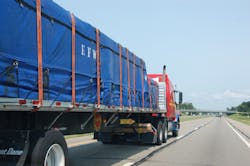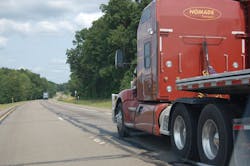FTR: Trucking conditions improve while trailer orders slide
Consulting firm FTR noted that its Trucking Conditions Index (TCI) measure for November jumped by more than three points to 8.64, which indicates trucking companies may expect more “favorable conditions” to develop as 2016 progresses.
On top of that, FTR noted that net trailer orders declined significantly in December – though it added such a decline “was expected” after two of the “strongest trailer order months in history,” said Don Ake, FTR’s VP of commercial vehicles, in a statement.
Back on the broader trucking front, FTR expects concern over tight capacity to grow among shippers in the second half of 2016, though there are downside risks for motor carriers if freight fails to grow as expected due to weak industrial output.
“The market seems to be in a momentary flux,” noted Jonathan Starks, FTR’s COO, in a statement.
“The news is loaded with reports of rapidly falling oil [prices], chaos in the foreign stock markets, and commodities markets continuing to fall,” he said. “However, the December jobs report was reasonably strong and most of the U.S. economic data points to a continuation of modest growth domestically. Inventory levels do remain a concern, but if they are concentrated in the retail sector there are less drastic measures needed to get manufacturing going again.”
Starks added that while the ISM Manufacturing Index is below the critical 50 mark, it hasn’t decelerated further, and a modest rebound in manufacturing is expected by mid-year.“If that holds true, then the modestly tight market that has embodied truck capacity for the last year should keep pressure on rate growth to stay positive and capacity to start to tighten in late 2016, ahead of implementation of several key regulations in 2017 – with speed limiters and ELDs topping that long list,” Starks emphasized.
“Our initial take for 2016 is to expect some more of the same: Modestly tight conditions in contract segments and somewhat looser conditions for spot activity,” he pointed out.
However, with the economic data “not clearly pointing” to an acceleration of economic growth, Starks stressed that the position of trucking companies is “somewhat tenuous, and the downside risks do seem to be increasing.”
In terms of trailers, FTR noted that net orders for December declined to 25,500 units, with total orders for 2015 reaching 313,000 units. Though December trailer orders were down considerably – falling 35% month-over-month and 43% year-over-year – the numbers “met expectations,” said FTR’s Ake.
“The order numbers are down month-over-month and year-over-year, but that is only because they are compared to two of the strongest order months in history,” he explained. “We enter 2016 with the largest backlog ever, so we can expect another strong trailer year.”
Ake pointed out that dry van orders “cooled” after three strong months, while refrigerated van and flatbed orders weakened due to cancelations, as OEMs cleaned up their backlogs at the end of the year.
December’s trailer build was down overall 3% from November, with both dry van and flatbed build rates slowing, he added, while production of refrigerated vans increased 13% month-over-month.
The liquid tank market remained steady, and dry tank production improved, and the dump trailer market continues strong, Ake said.
“The market continues to be driven by robust demand for dry and refrigerated vans,” he pointed out. “Consumer spending has been steady, and there is still some pent-up demand for vans [though] production is expected to ease back moderately in the second half of 2016. Most of the vocational markets are struggling a bit, except for dump trailers, which show no sign of slowing anytime soon.”

